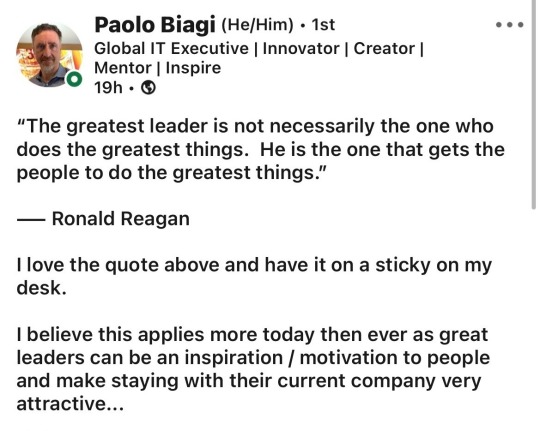#Leadership Development
Text
Theories of Leadership
Leadership theory is a vast field with various approaches and models that attempt to explain and guide leadership practices. Here are some prominent theories of leadership:
Trait Theory: This early theory posits that effective leaders possess specific traits or characteristics, such as intelligence, confidence, charisma, and determination, which make them natural leaders.
Behavioral Theories: These theories focus on the actions and behaviors of leaders rather than inherent traits. They classify leadership styles into categories like autocratic, democratic, and laissez-faire leadership, and assess their effectiveness.
Contingency Theories: Contingency models, including Fiedler's Contingency Model and Hersey-Blanchard's Situational Leadership Theory, propose that effective leadership depends on various situational factors, such as the leader's style, the followers, and the context.
Transformational Leadership: Transformational leaders inspire and motivate their followers to achieve higher levels of performance. They often use charisma, vision, and individualized consideration to encourage personal growth in their teams.
Transactional Leadership: Transactional leaders focus on exchanges with their followers. They set clear expectations, provide rewards or punishments based on performance, and ensure that their followers meet certain standards.
Servant Leadership: This philosophy emphasizes leaders' role as servants to their followers. Servant leaders prioritize the well-being of their teams and aim to serve and support their needs.
Authentic Leadership: Authentic leaders are genuine, self-aware, and lead by example. They align their actions with their values and encourage open and honest communication within their teams.
Situational Leadership: Developed by Hersey and Blanchard, this theory suggests that leadership style should adapt to the readiness and development level of the followers. Effective leaders adjust their behavior to the specific needs of their team members.
Path-Goal Theory: This theory, proposed by Robert House, posits that leaders should help followers achieve their goals by clarifying paths, removing obstacles, and providing support, which can improve job satisfaction and performance.
Leader-Member Exchange (LMX) Theory: LMX theory focuses on the unique relationships that develop between leaders and their individual followers. It suggests that leaders often have varying relationships with different members of their teams.
Charismatic Leadership: Charismatic leaders inspire followers through their personal charm, vision, and charisma. They have a strong influence on their teams and can create a sense of shared mission.
Trait and Skills Theory: This modern approach combines trait-based leadership research with the development of leadership skills. It recognizes that while certain traits are beneficial, leadership can also be learned and developed.
Ethical Leadership: Ethical leadership places a strong emphasis on moral and ethical principles. Ethical leaders act with integrity, model ethical behavior, and make ethical decisions.
Distributed Leadership: This perspective suggests that leadership is not the sole responsibility of one individual but can be distributed among team members. It emphasizes shared leadership and collaboration.
Adaptive Leadership: Adaptive leaders focus on facilitating change and guiding organizations or teams through challenges. They encourage flexibility and innovation.
These are just a few examples of the many leadership theories and models. Leadership scholars and practitioners often draw from multiple theories to adapt their leadership approach to specific situations and contexts.
#philosophy#epistemology#knowledge#learning#education#chatgpt#ethics#psychology#economics#politics#Leadership Philosophy#Leadership Theories#Leadership Styles#Leadership Development#Leadership Skills#Leadership and Ethics
47 notes
·
View notes
Text
Embracing Redundancy — My Unconventional Path to Career Progression
Exploring the rugged terrains of Australia, going off-road isn’t just a pastime for me; it’s a profound lesson in resilience, discovery, and stewardship. There’s a thrill in navigating unfamiliar paths, in the challenge and unpredictability it brings.
But beyond the adventure, it’s a practice grounded in respect — for the land, for the journey, and for those who will follow. The off-roader’s…

View On WordPress
2 notes
·
View notes
Text

#invincible life#invincible career#invincible solopreneurs#career coaching#career coach#career#leadership coach#leadership development#professional development#creativity#innovation#writers block#creative#creativity tips#sustainable innovation#innovation culture#stuck#blocked
20 notes
·
View notes
Text

True leaders are not driven by power and authority, but by a sincere desire to serve and uplift others. They prioritize the well-being, growth, and development of their team members, catering to their needs and aspirations.
Seek out those who embody this!
#workplace#inspiration#leadership#motivation#career success#professional growth#teamwork#leadership development#inspiring quotes#positivity#empowered#success mindset#wisdom#lead by example#leadership skills#team building
3 notes
·
View notes
Text
Are you a Leader or a Follower? Exploring both Avenues
Daily writing promptAre you a leader or a follower?View all responses
The choice between being a leader or a follower depends on personal preferences and the context. Leaders take charge, provide guidance, and make decisions, while followers support and implement the leader’s vision. Some people thrive in leadership roles, enjoying the responsibility and the opportunity to influence others.…

View On WordPress
#dailyprompt#dailyprompt-1939#effective leadership#leadership#leadership development#leadership in the workplace#leadership mindset#leadership qualities#leadership skills#leadership strategies#leadership styles#leadership success#leadership techniques#leadership theories#leadership tips#leadership training#leadership traits
2 notes
·
View notes
Text
Strategic Approaches for Effective IT Talent Management and Development
In this blog, we will explore the importance of IT talent management and development, the challenges associated with it, and strategies that organizations can use to develop and retain their IT talent. Read more...
The world is experiencing a digital revolution, and as a result, IT talent management and development have become essential for organizations to stay ahead of the competition. The rapid evolution of technology has led to an increasing demand for skilled IT professionals. As a result, organizations must develop and retain top IT talent to ensure that they remain competitive in the marketplace.
In…

View On WordPress
#career growth#collaboration#continuous learning#data analytics#Diversity and inclusion#emerging technologies#employee retention#flexible work arrangements#IT professionals#IT skills#IT talent management#leadership development#succession planning#talent development
3 notes
·
View notes
Video
youtube
Leadership is Everyone’s Business
#youtube#leadership is everyone’s business#leadership business#leadership business management#leadership business studies#leadership development#leadership training programs
0 notes
Text
Creating a Positive Workplace Culture
youtube
Are you ready to lead the future of work? Discover how to foster a thriving workplace culture and lead the future of work in our latest video! Join Andrew Lamb as he explores the critical role of HR executives in anticipating and shaping workplace trends. This insightful video delves into the integration of technology in everyday work, the importance of flexible work environments, and how employee-driven innovation can redefine industries. You'll learn practical strategies to prepare your organization for the future, ensuring it not only survives but thrives in a rapidly changing world. Don't miss out on our valuable content! Follow 4 Leaf Performance on our social media platforms to stay updated with the latest trends and insights. Connect with us on Facebook, Twitter, LinkedIn, and Instagram for more tips and discussions: Facebook: https://www.facebook.com/4leafperformance Instagram: https://www.instagram.com/4leafperformance/ Twitter: https://twitter.com/4LPerformance LinkedIn: https://www.linkedin.com/company/4leafperformance/ Blog: https://www.4leafperformance.com/how-to-handle-a-toxic-work-culture/ Are you an HR executive exploring the frontier of modern workplace management? We'd love to hear your thoughts! Share your experiences and ideas in the comments section. Join our newsletter and get free business advice and many valuable resources every week! https://link.marketmyco.com/widget/form/8OWTZWIU7ayVnoUhvCZg
0 notes
Text
The Philosophy of Leadership
The philosophy of leadership is a multidisciplinary field that explores the nature, principles, and ethics of effective leadership. It encompasses various philosophical, psychological, and ethical perspectives on leadership and aims to understand what constitutes successful and ethical leadership. Here are some key elements and areas of focus in the philosophy of leadership:
Leadership Ethics: Examining the ethical responsibilities and moral principles that guide leaders in their decision-making and actions.
Leadership Theories: Analyzing different leadership theories, such as transformational leadership, servant leadership, and ethical leadership, to understand the underlying philosophies and values that inform these approaches.
Leadership and Power: Investigating the relationship between leadership and power, including how leaders acquire, use, and share power, and the ethical implications of power dynamics.
Leadership and Morality: Exploring the moral dimensions of leadership, including the moral character of leaders and the moral dilemmas they face in their roles.
Leadership and Authenticity: Examining the concept of authentic leadership, which emphasizes the importance of aligning personal values and beliefs with one's leadership style.
Leadership and Virtue Ethics: Applying virtue ethics to leadership, focusing on the development of virtuous leadership traits and the role of character in effective leadership.
Leadership and Social Justice: Investigating how leaders can promote social justice, equity, and fairness through their actions and policies.
Leadership and Followership: Understanding the role of followers in the philosophy of leadership and how leaders can foster positive relationships with their followers.
Leadership in Different Contexts: Considering how leadership philosophy may vary across different contexts, such as business, politics, education, and nonprofit organizations.
Historical Perspectives: Exploring historical examples of leadership and how leadership philosophies have evolved over time.
The philosophy of leadership aims to contribute to the development of principled, effective, and ethical leaders who can positively impact organizations, communities, and society as a whole. It provides a philosophical foundation for leadership development and decision-making, emphasizing the importance of ethical and values-based leadership.
#philosophy#epistemology#knowledge#learning#education#chatgpt#ethics#psychology#politics#economics#Leadership Philosophy#Leadership Theories#Trait Theory#Transformational Leadership#Authentic Leadership#Ethical Leadership#Leadership Styles#Leadership Development#Leadership Skills#Leadership and Ethics
21 notes
·
View notes
Text
Re-Thinking the MBA
An analysis and opinion
MBA’s Historical Prestige and Current Scrutiny
The Master of Business Administration (MBA) has long been a cornerstone in the edifice of business education. Historically, it has been revered as a prestigious gateway to senior management and leadership roles within the corporate sphere. Originating as a means to instill a comprehensive understanding of business…

View On WordPress
2 notes
·
View notes
Text

#invincible life#invincible career#invincible solopreneurs#career coaching#career coach#leadership#career#leadership coach#leadership development#professional development#annual goals#manager#boss#new job#work#cillian murphy
11 notes
·
View notes
Text
https://indialeadersforsocialsector.com/the-role-of-mentorship-in-womens-leadership-development-in-the-social-sector/
#ilss#student life#leadership#leadership development#leadership development program#leadership development courses#leadership development training#corporate leadership development program#fundraising for ngo
0 notes
Text
Top 5 compelling reasons to invest in enhancing emotional resilience in leadership teams
Our experience in coaching leadership teams has been extremely fascinating and resonates with the above quote of Angela Duckworth Like it or not, teams get immeensley influenced with the emotional terbulance of their leaders .
Stress Management and Decision-Making: Leadership roles often come with high levels of stress and pressure. Emotional resilience equips leaders with the tools to manage stress effectively and make well-informed decisions even in challenging situations .
Enhanced Adaptability: The business landscape is constantly evolving, requiring leaders to navigate uncertainty and change. Emotional resilience helps leaders remain flexible and adaptable in the face of unexpected challenges.
Improved Team Collaboration and Morale: Resilient leaders are better equipped to handle conflicts, disagreements, and difficult conversations .
Effective Leadership Role Modeling: Leaders serve as role models for their teams. When leaders demonstrate emotional resilience, they set an example for others to follow.
Long-Term Well-being and Retention: Emotionally resilient leaders are less likely to experience burnout or prolonged negative effects from stress.
Incorporating emotional resilience training and practices into leadership development programs can lead to a more empowered, adaptable, and effective leadership team.
Know more about our work on building emotional resilience of leadership teams.
#leadeship coaching bangalore#leadership coaching#business leadership#business coach#leadership coaching companies in bangalore#leadership development#leadership development program#leadership#leadership coaching program#leadership training
0 notes
Text
Leaders: Is Your Myopia Your Utopia?
Watch out for becoming too single vision in your leadership style.
When it comes to leadership and management, nearsightedness or myopia is a common occurrence. What does that mean? Is Your Myopia Your Utopia?
Single vision
Since effective leadership is part art as much as part science, I see too many managers taking a nearsighted look at their role and responsibility. Nearsightedness is called myopia. By this I mean we place more emphasis on the duties and…

View On WordPress
#Best Executive coaches near Houston TX#Best Institute for Executive Coaching near Houston#Business Consultants in Houston TX#Business Consulting Services in Houston TX#Centre for Executive Coaching#doug thorpe coaching#Executive and leadership coaching in Houston TX#executive coaching#Executive Coaching Articles#Executive Coaching Houston Tx#Executive Coaching Institute in Houston TX#Houston executive coaching#Houston Executive Coaching Institute#Houston Leadership Coaching#Leadership and team coaching near Houston#leadership development#leadership development near me#Leadership Qualities#Management Consulting Firm Houston TX#One-on-one executive coaching#Professional and leadership coaching#team coaching#Team coaching consultant#Team development consultant
0 notes
Text
Explore the evolving landscape of business coaching and its transformative impact on tomorrow's entrepreneurs. Dive into insights shaping the future of mentorship and leadership development.
0 notes
Text
Navigating the Workplace with Strategic Talent Mapping
youtube
Are you ready to transform your business culture into a powerhouse of positivity and productivity? Discover the power of fostering a positive workplace culture in our detailed exploration. This video by Andrew lamb looks deeply into the essence of strategic talent mapping, a visionary approach that transcends traditional hiring to prepare your business for tomorrow's challenges. Learn how to analyze your current workforce, predict future needs, and align your talent strategy with your organizational goals to ensure a proactive, skilled, and adaptable team. Don’t stop here! Follow us on our social media channels [Insert Links] for more updates and valuable content that can revolutionize your professional journey. Connect, learn, and grow with us!: Facebook: https://www.facebook.com/4leafperformance Instagram: https://www.instagram.com/4leafperformance/ Twitter: https://twitter.com/4LPerformance LinkedIn: https://www.linkedin.com/company/4leafperformance/ Blog: https://www.4leafperformance.com/how-to-handle-a-toxic-work-culture/ Engage with us in the comments below, share your insights, or ask questions about fostering a thriving workplace culture. Let’s navigate the future of workforce planning together! Don’t forget to subscribe to our weekly newsletter for exclusive content and insider tips directly in your inbox: https://link.marketmyco.com/widget/form/8OWTZWIU7ayVnoUhvCZg
1 note
·
View note